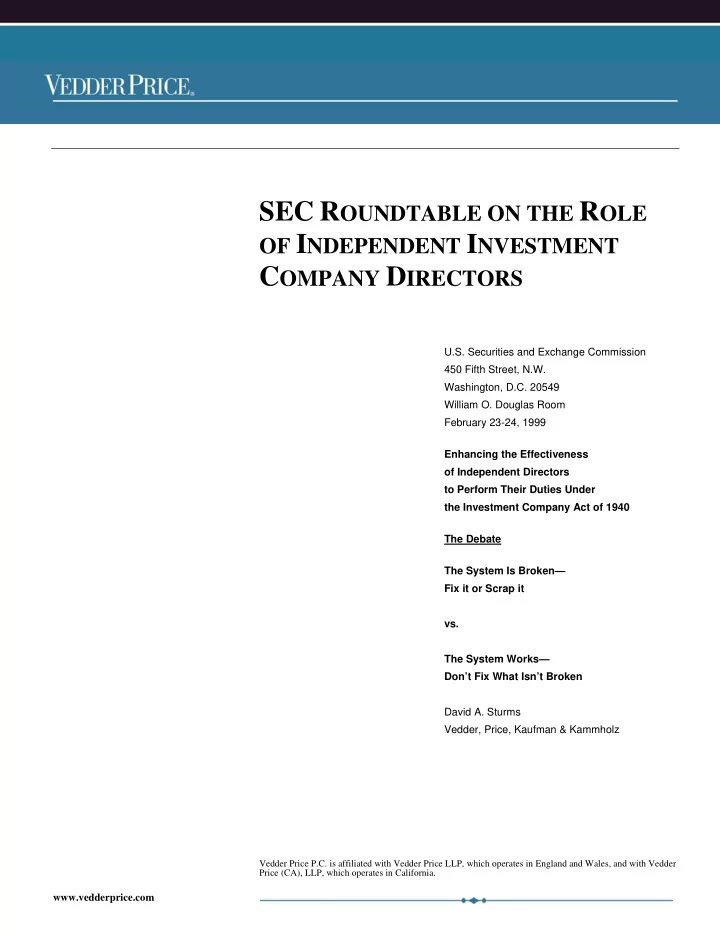

SEC R OUNDTABLE ON THE R OLE OF I NDEPENDENT I NVESTMENT C OMPANY D IRECTORS U.S. Securities and Exchange Commission 450 Fifth Street, N.W. Washington, D.C. 20549 William O. Douglas Room February 23-24, 1999 Enhancing the Effectiveness of Independent Directors to Perform Their Duties Under the Investment Company Act of 1940 The Debate The System Is Broken— Fix it or Scrap it vs. The System Works— Don’t Fix What Isn’t Broken David A. Sturms Vedder, Price, Kaufman & Kammholz Vedder Price P.C. is affiliated with Vedder Price LLP, which operates in England and Wales, and with Vedder Price (CA), LLP, which operates in California. www.vedderprice.com
T ABLE OF C ONTENTS I. Introduction ......................................................................................................... 1 II. The System Is Broken .......................................................................................... 1 A. Theory vs. Reality ........................................................................................ 1 B. Examples ...................................................................................................... 3 1. The Adviser vs. the Independent Directors .......................................... 3 a. Navellier ....................................................................................... 3 b. Fundamental ................................................................................. 3 c. The Yacktman Funds ................................................................... 4 2. The Commission vs. the Independent Directors ................................... 5 a. Parnassus ...................................................................................... 5 b. Community Bankers..................................................................... 5 3. The Shareholders vs. the Independent Directors: Strougo et al. Litigation .............................................................................................. 6 4. The Press vs. the Independent Directors .............................................. 6 C. Scrap the Current System — The Unitary Investment Fund (“UIF”) Approach ...................................................................................................... 8 1. The Original UIF Proposal ................................................................... 8 2. Modified UIF Proposal ........................................................................ 9 D. Modify the Current System ........................................................................ 10 1. 1992 SEC Study — the “no-brainers” ................................................ 10 2. Additional Regulatory/Legislative Options ........................................ 11 a. Do not allow an investment adviser (or affiliate) to seek to remove or replace independent directors without a Commission Order. .................................................... 11 b. Allow the board to replace the adviser without requiring shareholder approval. .................................................. 11 c. Rescind 1980 SEC Release as it relates to the advancement of expenses for independent directors. ................. 12 d. Require independent directors to have counsel separate from counsel for the adviser. ........................................ 13 III. The System Works ............................................................................................. 14 A. The “Nuclear Threat” is a great deterrent .................................................. 14 B. Independent directors do say “no” ............................................................. 15 C. Independent directors provide a check against conflicts of interest ........... 15 D. The costs are de minimis ............................................................................ 15 IV. Conclusion ......................................................................................................... 15 …
SEC ROUNDTABLE ON THE ROLE OF INDEPENDENT INVESTMENT COMPANY DIRECTORS I. Introduction The New York Times recently asked: “What’s a mutual fund director to do? . . . [W]hen independent directors have stood up to fund managers, they’ve gotten their ears boxed. And when . . . the directors have let fund managers go their own way, they’ve gotten their ears boxed again.”1 For example, the directors of the Navellier, Fundamental and Yacktman funds, who sought to fulfill their fiduciary duties by taking issue with their funds’ advisers, were targets of heated proxy battles and/or costly litigation. On the other hand, the SEC brought charges against the independent directors of the Parnassus fund for failing to challenge the adviser’s valuation of portfolio securities; shareholders have brought suit against independent directors for being “house boards” indebted to, and controlled and dominated by, the adviser; and Morningstar has questioned the independence of directors by pointing out that the more independent directors are paid, the higher a fund’s expenses. This crossfire of criticism caused the New York Times to exclaim that “rarely, if ever, . . . have fund directors been under fire on so many fronts at once.” 2 It is appropriate, therefore, to reexamine the role of independent directors under the Investment Company Act of 1940 (the “Act”). Are they, as some have complained, an ineffectual archaism that cannot provide meaningful oversight or, as others have claimed, the cornerstone of the Act? Let the debate begin. II. The System Is Broken A. Theory vs. Reality In theory, a fund is owned by its shareholders who hire independent directors to run it. The directors, in turn, select various service providers, including an investment adviser, to manage the fund. In reality, a fund is usually created, sponsored, and operated by the adviser. It is the adviser’s services, in a pooled investment product, not the directors, that investors buy. Given such a chasm between theory and reality, is it any wonder that independent directors have been accused of being ineffectual? As one commentator has stated: Recent discussions of problems in the mutual fund industry . . . contain numerous statements of opinion that, in many cases, [independent] directors of mutual funds have not performed an effective role in safeguarding the interests of mutual fund shareholders . . . . [Independent] directors normally lack the power to exercise meaningful restraints on the investment adviser or principal underwriter . . . . In his typically vivid way, a leading critic of the mutual fund industry has argued that since “the men who need to be watched pick the watchdogs,” no one can expect the [independent] directors to oppose the adviser . . . in areas where the adviser’s . . . economic interests are heavily at stake. 3 What’s amazing to this commentator is that the above passage is not from a recent publication, but from a 1967 law review article. In the words of Yogi Berra, “It’s dèjá vu all over again.” 1 Edward Wyatt, When Empty Suits Fill the Board Room, N.Y. Times, June 7, 1998. 2 Id. 3 Robert H. Mundheim, Some Thoughts on the Duties and Responsibilities of Unaffiliated Directors of Mutual Funds, 115 U. PA. L. Rev. 1058 (1967) (hereinafter “Mundheim”). www.vedderprice.com 1
Recommend
More recommend